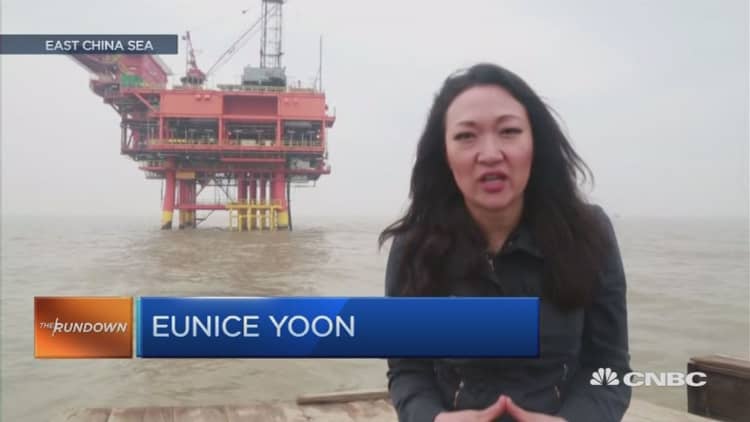
Fishermen are paying the price as Asia's superpowers vie for control of the resource-rich waters and islands of the East China Sea.
The stock of almost all seafood in the area was becoming increasingly scarce as China and Japan asserted sovereignty over a group of eight uninhabited islands—known as Senkaku in Japanese and Diaoyu in Chinese—and their oil riches, fishermen told CNBC.
Zhang Yuxiang from the oil town of Dongying on the mainland's northern coast has been working the East China Sea for the past three decades.
"The water quality doesn't even compare to 30 years ago," he said. "Back then, you would fill your hold with big, fresh crabs in one night. But now those crabs have disappeared."
The waters were less fertile because the fishing grounds overlapped with key oil sites, he explained. "We are at the nexus point where the Yellow River meets the innermost bay of the East China Sea. The government has been investing heavily in the oil platforms throughout these waters. This is the biggest offshore drilling operation in China."
In an April report, the U.S.-China Economic and Security Review Commission explained how increased maritime activity could damage local fisheries, using as an example the neighboring South China Sea, home to some of the world's busiest shipping lanes.
"The sand and silt plumes created by dredging sand and gravel and depositing it on the coral reefs either would have killed fish or expelled them from the reefs," the report said. "Most of the small expelled fish would have been eaten by open-water species as they left the protection of the reef and became exposed to predators."
The disputed East China Sea islands hold an estimated 200 million barrels of oil reserves, according to the U.S. Energy Information Administration. Beijing has built oil and gas exploration platforms in the area, infuriating Japan, which has raised the possibility of seeking international arbitration on the matter. The islands are also strategically located near key shipping routes, making them a valuable asset.
But as the price of oil extends declines, Zhang said he had noticed a different kind of activity disrupting local marine life.
"It's cheaper now to import crude oil from overseas than to drill for it here, so we see more oil carried in by tankers," he said, adding that government officials should deal with the consequences of their actions.
"It's necessary to tap crude oil resources, but you need to take appropriate measures and care for the environment."
The islands have been part of Japanese territory since 1895 and were briefly controlled by the U.S. as part of its post-World War II occupation of Japan, according to the Council of Foreign Relations (CFR). When Washington was ready to return the territory to Japan in the 1970s, Beijing began contesting Japan's right to the islands after a United Nations survey revealed the potential of significant hydrocarbon resources, CFR said.
Tensions then escalated in 2013 when Beijing declared it had established an air defense identification zone over two-thirds of the East China Sea. Most recently,Japan opened a radar surveillance station near the islands in March.
Shipping and energy interests aside, Beijing likely wanted to tap the area for its rich biodiversity, according to political consultancy firm Stratfor.
"In 2012, the Chinese government assessed its main fishing areas—the Bohai Sea, the Yellow Sea, the East China Sea and the South China Sea. The survey recognized the significantly reduced stocks in the Bohai and Yellow seas and called for a reduction in fishing to allow stocks to replenish. But it argued for an increase in fishing in the East and South China seas."



